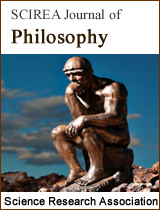Knowledge Mining Based on the Aristotelian Modal Syllogism ▢EAO-3
DOI: 10.54647/philosophy720095 17 Downloads 12561 Views
Author(s)
Abstract
This paper formalizes Aristotelian modal syllogism within the framework of knowledge mining and subsequently proves the validity of the Aristotelian modal syllogism ▢EAO-3 through the application of modal logic and generalized quantifier theory. Moreover, by means of the integration of specific rules and facts derived from first-order logic, the definitions of outer and inner negations of Aristotelian quantifiers in generalized quantifier theory, a minimum of 25 additional valid Aristotelian modal syllogisms based on the validity of the syllogism ▢EAO-3 have been successfully derived from the perspective of artificial intelligence knowledge mining. The proposed method not only exhibits elegance and simplicity, but also demonstrates its potential for universal applicability to diverse syllogistic scenarios. Undoubtedly, this research makes a significant contribution to the knowledge mining in the field of artificial intelligence.
Keywords
Aristotelian modal syllogisms; knowledge mining; validity; generalized quantifier theory
Cite this paper
Jingyi Zhang, Yijiang Hao,
Knowledge Mining Based on the Aristotelian Modal Syllogism ▢EAO-3
, SCIREA Journal of Philosophy.
Volume 4, Issue 2, April 2024 | PP. 43-49.
10.54647/philosophy720095
References
| [ 1 ] | L. S. Moss. (2008) Completeness theorems for syllogistic fragments, in F. Hamm and S. Kepser (eds.), Logics for Linguistic Structures, Mouton de Gruyter, Berlin, pp.143-173. |
| [ 2 ] | J. Endrullis and L. S. Moss. (2015) Syllogistic logic with ‘most’, in V. de Paiva et al. (eds. ), Logic, Language, Information, and Computation, pp.124-139. |
| [ 3 ] | F. Johnson. (1989) Models for modal syllogisms, Notre Dame Journal of Formal Logic, 30: 271-284. |
| [ 4 ] | J. Łukasiewicz. (1957) Aristotle’s Syllogistic: From the Standpoint of Modern Formal Logic (2nd Edition), Clerndon Press, Oxford. |
| [ 5 ] | S. McCall. (1963) Studies in Logic and the Foundations of Mathematics, Aristotle’s Modal Syllogisms, North-Holland Publishing Company, Amsterdam. |
| [ 6 ] | Thomason, S. K. (1997) Relational Modal for the Modal Syllogistic”, Journal of Philosophical Logic, 26: 129-1141. |
| [ 7 ] | F. Johnson. (2004) Aristotle’s modal syllogisms, Handbook of the History of Logic, I: 247-338. |
| [ 8 ] | M. Malink. (2013) Aristotle’s Modal Syllogistic, Harvard University Press, Cambridge, MA. |
| [ 9 ] | X. J. Zhang. (2020) Screening out All Valid Aristotelian Modal Syllogisms, Applied and Computational Mathematicsa, 8(6): 95-104. |
| [ 10 ] | P. R. Halmos. (1974) Naive Set Theory, Springer-Verlag, New York. |
| [ 11 ] | B. Chen. (2020) Introduction to Logic (4th Edition), China Renmin University of Press. (in Chinese) |
| [ 12 ] | F. Chellas. (1980) Modal Logic: an Introduction, Cambridge University Press, Cambridge. |

